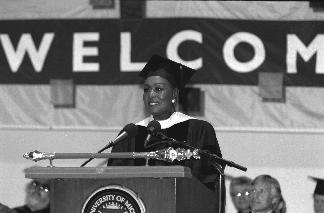The University Record, September 10, 1997
|
|
‘Learn everything you can because you never know when you’ll need it,’ urged Shirley Verrett, School of Music professor and faculty speaker at the New Student Convocation Sept. 2 in Hill Auditorium. Verrett punctuated her speech with anecdotes and snippets of song from her career as a renowned international opera singer. The evening’s program included speeches by Verrett, President Lee C. Bollinger, Director of Admissions Theodore Spencer, MSA President Michael Nagrant and entertainment by numerous campus performing groups. Photo by Bob Kalmbach |
By Janet Nellis Mendler
News and Information Services
“Don’t let fear of rejection and dread of making hard decisions slow down your intellectual curiosity or your personal development,” music Prof. Shirley Verrett admonished nearly 4,000 students who packed Hill Auditorium last week for New Student Convocation.
The class of 2001 is unique, said President Lee C. Bollinger, as its members begin their studies in one century and finish in another. “If all goes well, and I’m sure it will, most of us will assemble again in May of 2001, to celebrate your graduation.”
The convocation was one of the highlights of Welcome to Michigan Week, and featured performances by the Michigan Marching Band, the Friars, the acapella group 58 Greene and a prelude and recessional played by Steven Ball, an undergraduate organ major. University Carillonneur Margo Halsted’s performance in Burton Tower acted as a magnet to draw students into Hill, whose upper balcony had to be opened to accommodate the crowd.
Verrett, a performer in American and European opera who joined the faculty last year, recounted her route from stage to classroom, emphasizing the importance of setting goals, striving toward them and being flexible as opportunities present themselves.
Between her years on the opera stage and her arrival at the U-M last September, she took time to appear in the Broadway musical “Carousel,” a move that stunned many of her operatic colleagues.
“I always had a burning desire to make the transition as a dramatic actress. I saw the Broadway production as the first step in that direction, “she said. “I saw it as an opportunity to reach a new and wider audience.”
As a consequence of that decision, she worked with young singers and actors, and it was the personal fulfillment that she received from working with the cast, and the subsequent realization that she had something to offer to young musicians, that led her to her teaching position.
“Not all of you who come through these portals will become major opera singers or renowned scholars. However, every one of you should leave this University as an educated person. I cannot stress strongly enough the importance of your overall general education.” And she cautioned her listeners that specializing too early was counter-productive and stunting to one’s growth. “My mother always told my brothers, sister and me to “learn everything you can, because you never know when you’ll need it.”
Bollinger pointed out that “we must recognize that much of our learning is or should be driven by some sense of wanting a relationship with other human beings. And to have that relationship, whether in a family, university, a nation or the world at large, you must learn at the very least how to communicate with others.” What is called for is a sense of community, of “who it is that we are going to care for, care about, and to what degree and in what form.”
Michael Nagrant, president of the Michigan Student Assembly, cautioned the class of 2001 about the danger of leaving the University with too many “what ifs” that hampered their exploration of something new.
“Sometimes in a new environment like the University of Michigan you will feel challenges you may never have felt in the past, you may feel bound by the possibility of failure. Take those thoughts of failure and use them as mortar in strengthening your mind. You must sometimes risk great failure to produce great achievements.”
In greeting the class of 2001, Louis G. D’Alecy, chair of the Senate Advisory Committee on University Affairs, welcomed the students to challenge and to freedom, and urged them “to seize the moment,” and challenge every professor.
The class of 2001 is talented both academically and physically. Some 62 percent reported participating in varsity athletics during high school, according to Theodore L. Spencer, director of undergraduate admissions, who served as master of ceremonies. Another 50 percent received special recognition for leadership, and more than half the students-2,843-received high enough scores on their Advanced Placement test to enter the U-M with college credit. Every state is represented, as well as more than 100 foreign countries, Spencer noted.
Maureen A. Hartford, vice president for student affairs, closed the hour-long ceremony with three hopes: “That you will know the faculty, you will take time for reflection, and you will work at building communities.”


